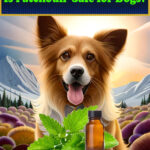Can Dogs Eat Ritz Crackers?
Can Dogs Eat Ritz Crackers? Dogs have been known to eat the Ritz crackers as early as the 19th century. The first record of dogs eating Ritz crackers was written by an English newspaper in 1849.
Dogs are omnivores, which means that they can eat plant-based foods like fruits, vegetables, and raw meat as well as animal-based foods like fish or meatballs.
Feeding your dog Ritz crackers may look like a treat for them but they contain wheat and is created by heating the grain in a baking tin. The taste of the Ritz crackers for your dog is “tasteless”. After feeding Ritz crackers to dogs many people report that their dogs had become constipated.
Can Dogs Eat Saltine Crackers?
Dogs can’t eat saltine crackers because they contain high amounts of sugar, salt, and carbohydrates. A combination of these three items can lead your dog to serious health problems which can cause stomach upset, weight gain, and salt poisoning.
Feeding one saltine cracker might not hurt your dog’s health but, it’s not recommended to feed lots of saltine crackers. Feeding too many saltine crackers can cause sodium poisoning. For the safety of your dog, it is recommended to keep saltine crackers away from your pet.
Can Dogs Eat Graham Crackers?
You can feed your dog graham crackers. Graham crackers are a combination of flour and sugar. They usually have a lot of calories and fat. The dog’s stomach doesn’t have the capacity to break down all those calories into energy, so it has to rely on its muscles to digest them.
If you feed your dog graham crackers in one sitting, you might want to give it some time before you start feeding it again. That way, the dog will be able to digest all those calories properly and feel satisfied after eating them.
Feeding your dog graham crackers also depends on the size and weight of your pet. Most dogs don’t need a high amount of calories in their diet per day.
Feeding lots of graham can lead to a quick weight increase which causes a wholly negative effect on the health of your pet. And also, if the blood sugar level is not normal it can cause diabetes.
Dogs can eat graham crackers but only a small amount. Graham crackers contain vitamins and minerals which are good for the health of your dog.
Can Dogs Eat Goldfish Crackers?
Dogs can’t eat goldfish crackers because it doesn’t have the necessary nutrients for the health of your pet. Goldfish crackers contain high amounts of salt, garlic powder, and onion powder which are injuries to the health of the dog. Eating lots of goldfish crackers result in vomiting, diarrhea, and weakness.
The first thing that you need to know about goldfish crackers is that they are not good snacks for dogs. They are too small and the texture of the crackers is too hard for dogs to chew. In addition, goldfish crackers are also high in sodium and fat.
Can Dogs Eat Animal Crackers?
You can feed your dog animal crackers it can be a good and healthy treat for your pet. Don’t feed your dog too many animal crackers because they contain large amounts of fats and sugar which can increase the weight of your pet. Animal crackers are good for the dogs to feed but only if they don’t have chocolate and xylitol in them.
You can feed your dog animal crackers without any worries as long as it doesn’t contain salt or any artificial flavor. These are not healthy or nutritious for your per diet. Feeding in a low quantity has no effect but feeding a large number of animal crackers can lead to stomach upset.
Can I give my dog a cream cracker?
Dogs are not allowed to have cream crackers. But it is possible to give them a few of these little treats. A dog can eat cream but only in a small amount if you give more cream can cause the death of your dog with diabetes.
Giving the regular dose of the cream daily can lead to an unbalanced diet and increases the unwanted pounds of your pet.
Can Dogs Eat Belvita Crackers?
Like other crackers, dogs can eat belvita crackers in a small amount not in too much amount because it contains a large amount of sugar and carbs which can cause serious health problems like an upset stomach with diarrhea and vomiting.
Can Dogs Eat Peanut Butter Crackers?
Crackers are not healthy and nutritious for the health of the dog. Dogs should not have to eat peanut butter crackers. But If you want to give peanut butter crackers treat to your pets, you should give them homemade peanut butter because all crackers sold in the grocery store are not ideal for dogs.
What kind of crackers can dogs eat?
Dogs can eat only plain crackers without extra added ingredients like salt, sugar, fats, and artificial flavors. Dogs can eat all kinds of crackers only a small amount per day, depending on the size, and lactose tolerance. The bigger the dog more crackers can be consumed. Small dogs cant digest more amount of crackers.
https://youtu.be/jPbGktCLvIw
Is Ritz Crackers Safe For Dogs?
The Ritz Cracker is a type of cracker that is available in many varieties including cheese and pepperoni varieties. It is made from wheat flour and its main ingredient is wheat flour, water, and salt. The Ritz Cracker makes use of this combination to produce tasty crackers that have a strong taste. However, it has been found that these crackers are not safe for dogs since they contain high levels of wheat gluten which can cause allergic reactions in dogs with sensitive skin such as allergies or asthma, especially when they eat them regularly.
What happens if a dog eats saltine crackers too much:
Saltine crackers are not recommended for your pet but if your dog eats lots of saltines it will cause sodium poisoning, it can cause diarrhea, vomiting, excessive thirst or urination, decreased appetite, and sluggishness.
Can dogs eat cheese?
Dogs can eat cheese, like Mozzarella and cottage cheese because these types of cheese contain low fats than other cheese. Cheese is safe for your dog but only a few bites of cheese per because more cheese can cause your pet’s digestion problem.
Feeding cheese to your dog depends on the size and the lactose tolerance. Big dogs can handle more cheese and small size dogs can’t handle more cheese and some dogs can’t handle cheese at all. If your dogs have a Lactose tolerance problem you can feed them Swiss cheese because it is low in lactose and easily digestible. Cheddar cheese has a low level of salt so it is safe in small pieces.



